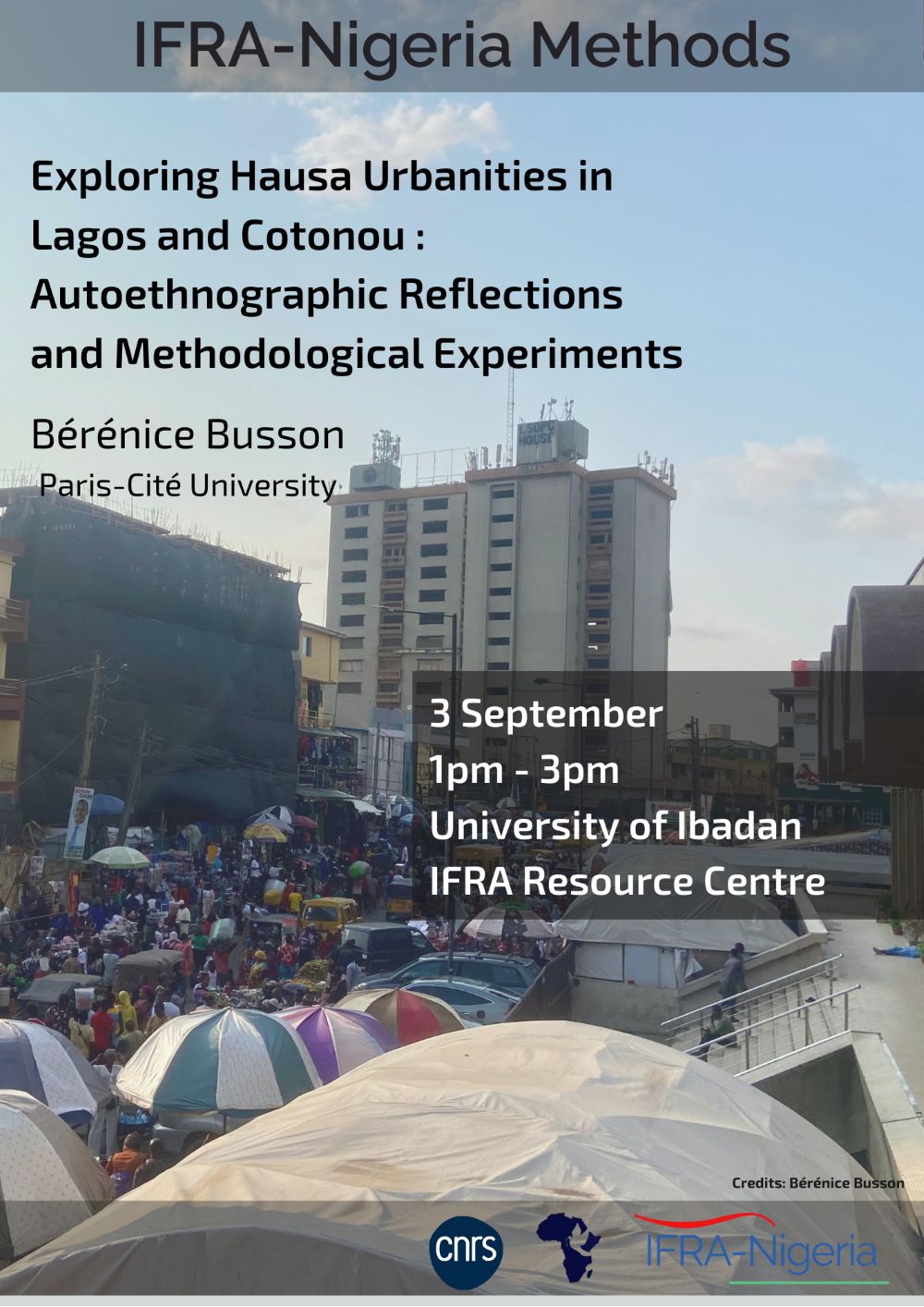Methodological Seminar "Exploring Hausa Urbanities in Lagos and Cotonou : Autoethnographic Reflections and Methodological Experiments"
 On 3 September 2025, Bérénice Busson, PhD student in geography at the Université Paris Cité (CESSMA Lab), held our first methodological seminar of the 2025-2026 academic year. She talked on "Exploring Hausa Urbanities in Lagos and Cotonou : Autoethnographic Reflections and Methodological Experiments".
On 3 September 2025, Bérénice Busson, PhD student in geography at the Université Paris Cité (CESSMA Lab), held our first methodological seminar of the 2025-2026 academic year. She talked on "Exploring Hausa Urbanities in Lagos and Cotonou : Autoethnographic Reflections and Methodological Experiments".
First, she presented the social position of Hausa, a fluid ethnic group from the Sahelian region, specifically from north Nigeria and south Niger. In Cotonou (Benin Republic), where she began her fieldwork, they are seen as a minority on two accounts : first as a religious minority, being mostly Muslim, and second, they are perceived as strangers from an "underdeveloped" region. On the basis of this observation, she stated her two questions : Considering their different economic background and time staying in the city, how do they negotiate their position in it? How are they coping with potential discriminations or obstacles to urban resources access, being in a subaltern position?
Bérénice Busson studied specifically Hausa traders, in different businesses and at different levels of the market chain. She also took into account how long they had been and would be staying in the city, as well as their migratory experiences. She chose to enter this study through the economic sector, studying the different sides of the business interaction, as it allows the researcher to better grasp hierarchies.

Bérénice Busson presenting her work
Her fieldwork is multi-sited, in both Cotonou and Lagos. In the former, she studied the Hausa car sector in 4 different locations in the city, with a total of 66 ethnographic partners. In Lagos, she focused on the textile sector, with a total of 8 months of fieldwork. She began with the Idumota market, a unique location as it is shared between Hausa men and mostly Yoruba women. Next, she spent time in the Idi Araba, a more residential area.
Bérénice Busson's methodology, though she is a geography student, rests on ethnographic approaches to better analyse the Hausa communities daily experiences of power relations and their production of political subjectivity. She stressed the importance of building a relationship with her partners in research over the long-term, and gathering information in an informal way rather than through semi-structured interviews. This allowed them to start talking casually about urban politics, permitting her to learn about their expectations from the State and their negotiation tactics with it.

The question of positionality is crucial as a young French woman interacting with mostly Muslim West African men. Indeed, both her and them must be able to socially justify these interactions. Moreover, in Benin, navigating a former colony as a French researcher, while France was getting increasingly criticized in the region, added an extra complexity. Once again, building a relationship of trust was crucial to overcoming initial wariness. She also decided to use this approach to avoid conducting an extractive research practice.

Additionally, she experimented with a number of innovative methodologies. She used film to interview her partners, who would at times express entirely new ideas through this medium. Next, since 2024, she has organized photographic workshops with her research partners, which serve to co-produce knowledge and to engage with them in new ways. This gave each participant the chance to represent what they wanted, whether about their life or the neighbourhood, and in so-doing fighting stereotypes. Together they co-created a photography collection. In August 2025, she also organised an exhibition in Cotonou, as a way to share her research and be accountable for the work she had been doing with them.
The session concluded with a Q&A in which Bérénice Busson and the participants considered questions of language barriers, the choice of economic sectors, and deconstructing preconceived notions of African identity.

Tags: Nigeria, Urban Governance, Cities, Benin, Lagos

Social Media
Mailing List